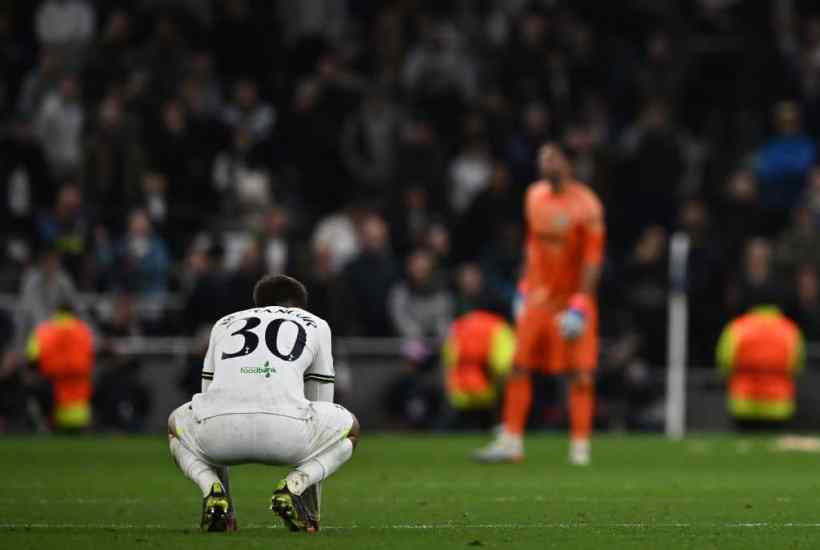There isn’t much that unites the fractious, dysfunctional football family. But in the UK, at least, there is something most fans seem to agree on: VAR – Video Assistant Referee – is awful.
The technology, introduced to limit errors and controversy, appears to be having the opposite effect. Critics speak of VAR as if it were a malevolent spirit tormenting players, supporters, and coaches alike. Its frequent manifestations usually involve lengthy pauses resulting in seemingly random judgements. Onlookers – particularly those watching in the stands – are often left perplexed and enraged.
This week, in a classic VAR episode, Spurs were denied a thrilling, potentially lucrative, last second winner in their Champion’s League tie with Sporting Lisbon – thanks to VAR. This triggered the excitable Spurs coach Antonio Conte who flew into a wildly gesticulating rage that earned him a red card. Was his fury justified?
Well…no. Conte’s anger signified nothing in the end. The decision was exceedingly tight, and the protracted delay tedious, but VAR was correct. By the letter of the law, Emerson Royal was offside and the goal, had it been awarded, would have been an injustice.
But that is so often the way with VAR. Marginal decisions provoke immediate manic foam flecked fury, which is often misplaced. According to premierleague.com before VAR was used the average of correct decisions in matches was 82 per cent. This rose to 94 per cent with VAR in 2019/2020. Things are even better in international football. At Euro 2020, Uefa reported that all VAR led 18 corrections that occurred in the 51 matches were correct, with 100 per cent accuracy in the 30 tight offside decisions.
These statistics often get lost amidst the bitter and emotional debate surrounding VAR. A correct decision is a banal and instantly forgettable detail; a wrong one a wounding injustice that heals only slowly.
This is not to say that VAR doesn’t deserve criticism or that there isn’t considerable room for improvement. The debacle of 3 September was VAR’s nadir in the Premier League. West Ham were denied a perfectly valid stoppage time equaliser against Chelsea. This was followed by a last-minute Newcastle winner against Crystal Palace being ruled out by Lee Mason watching on a monitor; again wrongly. It all proved too much for Alan Shearer who had a meltdown in the Match of the Day studio.
VAR certainly needs work. Delays are long and the desired level of precision unrealistic. Offside is especially problematic. Whatever the rule says, it surely was never intended to penalise a player whose fingernail was a milimeter ahead of the last defender when a pass was released. And when was the pass released? As Graham Souness noted early on in the VAR era, is it technically possible to isolate the exact moment a ball leaves an attacker’s boot?
Greater lassitude is required. Football is not a slide rule sport. It’s not snooker or golf, where precise rules and a certain etiquette are appropriate. Goals that are more or less legitimate have traditionally been allowed to stand, with only glaring errors needing correction.
But those seeking to throw out VAR altogether might do well to remember why it was introduced in the first place. One reason VAR was given the green light by Fifa was because of an injustice against England at the 2010 World Cup. Frank Lampard’s lob fell a yard over the line but it was not counted as a goal. The embarrassment of Fifa president Sepp Blatter watching from the stands as the phantom goal was replayed on the big screens was palpable. Such absurdities would be a regular occurrence without VAR. Do we really want that?
In a sport where the gulf between rich and poorer is becoming unbridgeable – where super leagues threaten to permanently exclude football’s hoi polloi, and where referees facing the immense burden of making split second decisions in high-stakes games can easily succumb to the pressure to give the super club the benefit of the doubt – should we really abandon one tool that, however imperfect, at least operates without prejudice?
Witness South Korea vs. Germany in the last World Cup. The linesman, under intense pressure, ruled South Korea’s last-minute goal, which would have effectively eliminated a football superpower for the first time in its history in the first round, offside. Thanks to VAR, that error was reversed and history was made. A World Cup classic was added to the annals.
Football’s lesser powers need all the help they can get. As Paul Newman’s character the lawyer Frank Galvin says in the classic film The Verdict, ‘The court doesn’t exist to give them (the weak) justice. It exists to give them a chance at justice.’
The same could be said of VAR.
Got something to add? Join the discussion and comment below.
Get 10 issues for just $10
Subscribe to The Spectator Australia today for the next 10 magazine issues, plus full online access, for just $10.



















Comments
Don't miss out
Join the conversation with other Spectator Australia readers. Subscribe to leave a comment.
SUBSCRIBEAlready a subscriber? Log in